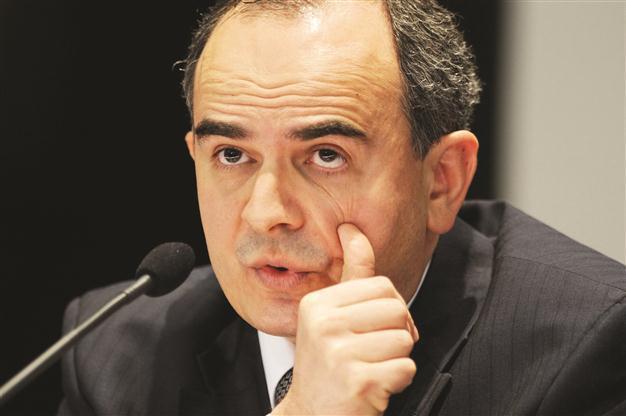Turkey’s forex reserves may drop to $50 billion
Erdal Sağlam / Hürriyet - ANKARA

Turkish Central Bank Gov Erdem Başçı poses during a press meeting in Ankara in this file photo. The Bank’s net reserves have been declining rapidly to $50 billion as it is continuing to intervene in the currency market in a bid to halt the Turkish Lira’s depreciation. DAILY NEWS photo, Selahattin SÖNMEZ
In the last working day of 2011, the Turkish Central Bank, fixated on the exchange rate level, intervened in the market by selling around $3 billion, and it continued the intervention Jan. 2.
Was it successful? The exchange rate level was there for everyone to see.
The markets perceive that the Central Bank has established a rate of 2.20 Turkish Liras for the euro-dollar basket, as it both sells dollars while curbing lira liquidity when this level is breached. In accordance with its Jan. 2 statement, the Central Bank is mopping up the liras it gets in exchange for dollars, refusing to provide lira liquidity in an effort to pressure the exchange rate further.
Why has the Central Bank fixated on the exchange rate? The official statement said the aim is not to let inflation rise even further from the current double-digit levels. But according to bankers, the Central Bank gave the message to foreign investors that they can enter Turkey at the 2.20 basket level. The reason is the high level of Treasury debt repayments in the first quarter.
If these tightening operations continue, the Treasury will have to hike interest rates to borrow. Thus, the Central Bank may be resorting to such a path to encourage foreigners to buy government debt at the current levels, trying to halt a sharp rise in interest rates. Despite this, the upper movement in rates has started and will continue.
To put it in another way, the Central Bank is making the Treasury pay the bill. Meanwhile, the Treasury has been said to be in an effort to inflate its means by “pen work,” as it enters a tight three months. According to bankers, the Treasury does not pay in cash as it tries to show a high level of year-end means like it did in the 1990s.
Frightening prospectsSo, how are foreign exchange reserves doing? If the eurozone crisis goes on for another four months and Turkey suffers from a lack of foreign currency inflows, will it be able to maintain the 2.20 level?
The Central Bank has been inflating the level of its forex reserves, but net reserves are melting away. Meanwhile, gross reserves look high due to the opportunity of banks to hold lira-reserve requirements and gold accounts in foreign currencies. Before the Dec. 30 intervention, gross reserves were at $92 billion, while net reserves were at only $55 billion. Thus, after the Dec. 30 and Jan. 2 interventions, net reserves have declined to around $50 billion.
Evidently, the Central Bank has burned at least $10 billion in reserves for nothing, in order not to raise interest rates. The movements in the last few days show that the burning of reserves will continue. And as interest rates rise, the bill will have to be paid by the Treasury.
The Central Bank was unable to halt the surge in exchange rates despite curbing lira liquidity and selling dollars. And this is happening despite the fact that no foreigners were active in the market on Dec. 30 and Jan. 2 – foreign markets were on holiday.
Starting from Jan. 3, foreigners will enter the market and the real effects will be observed starting next week. Thus, banks are eyeing what foreigners will do. If they enter the market with the intention to sell, it will be much harder for the Central Bank to halt exchange rate appreciation.
The new year came with serious movement in the markets. We hope it won’t end in tears.
This analysis by Erdal Sağlam was published yesterday by the daily Hürriyet.
